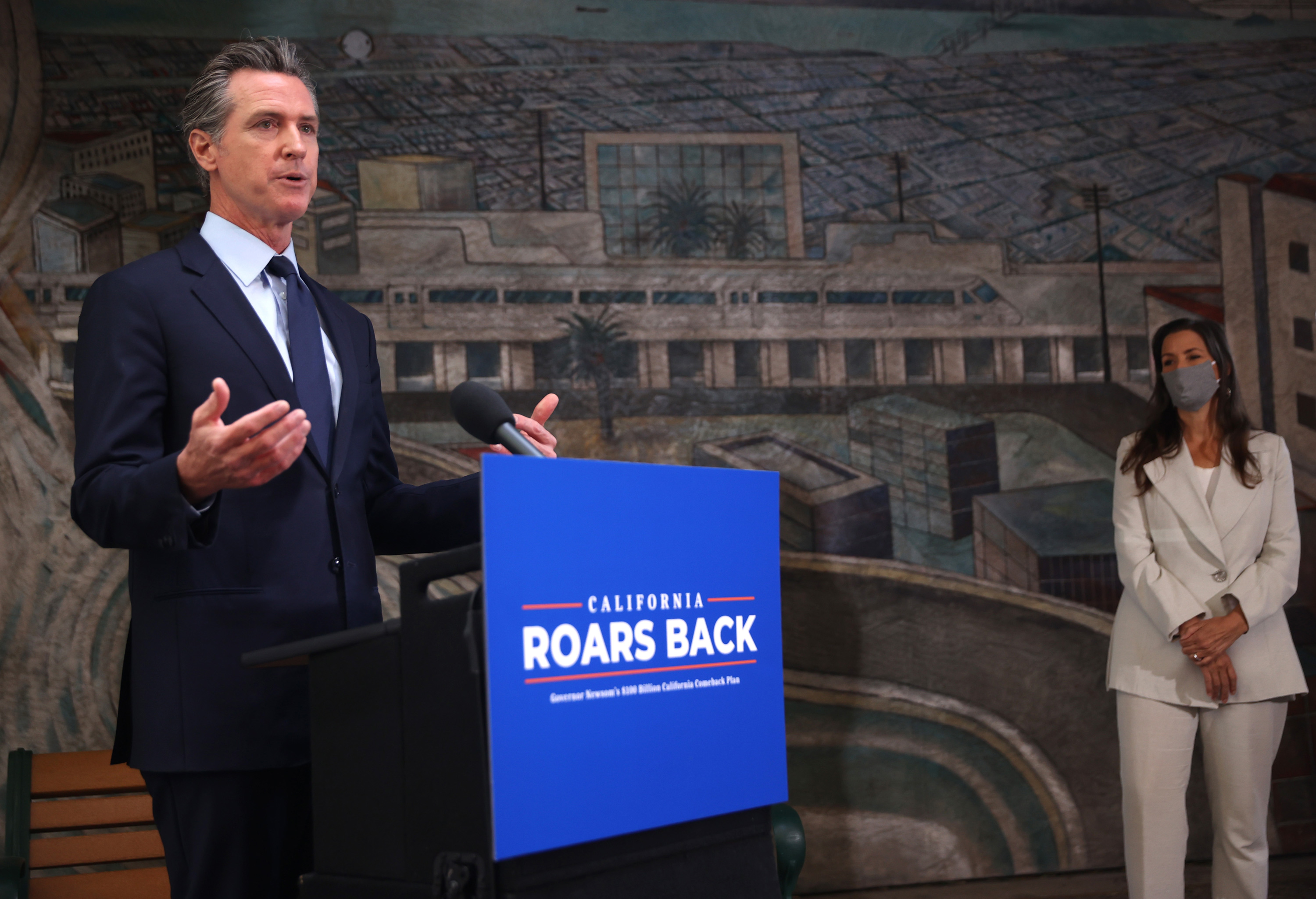
California Governor Gavin Newsom wants to end homelessness in the state in five years
The proclamation comes after announcing a new $12 billion proposal to combat the issue — the most invested in history if accepted by the state legislature.
On Tuesday, May 11, California Gov. Gavin Newsom announced a $12 billion proposal to solve the homelessness crisis in the state.
“As governor I actually want to get something done. I don’t want to talk about this for a decade," the governor said.
California is the nation’s most populous state and it's estimated that 161,000 people are currently experiencing homelessness, which is the most out of any other state.
If his plan garners support in the state legislature, its implementation would rely primarily on the eagerness of local governments.
According to Jason Elliott, a Newsom advisor who works on housing and homelessness, local leaders did show support for the previous program during the pandemic, which converted 94 hotels, motels and other properties into emergency housing.
LIVE NOW: Governor @GavinNewsom announces a historic $12 billion package bolstering the state’s response to the homelessness crisis. #CAcomeback https://t.co/x2XxUbPtdK
— Office of the Governor of California (@CAgovernor) May 11, 2021
Yet it still remains a very challenging issue to tackle, as it tends to be a controversial subject to some residents, and long-lasting solutions will require a collective effort.
“Every community group that you go to demands that you solve the problem of homelessness, and then in the exact same meeting they’ll demand that you don’t solve it anywhere near them,” said San Diego County Supervisor Nathan Fletcher.
The new pending proposal comes as part of Newsom’s $100 billion California Comeback Plan, which rolls out this week.
Focusing on homelessness, a cause for much concern in the state, could turn out to be politically helpful for the governor as he faces an expected recall election later in the year.
Newsom officials reported that the $800 million spent on Roomkey last year created 6,000 more housing units, and provided shelter for 8,200 people.
HUGE: FEMA just announced it will permanently fund CA’s Project Roomkey—making hotels available for those in need for the duration of the pandemic.
— Gavin Newsom (@GavinNewsom) December 19, 2020
Project Roomkey has already sheltered 23,000+ homeless individuals. Now, we can continue that work. pic.twitter.com/7iWwwwAT0D
Officials also said at a recent briefing that it’s more cost efficient to build new housing from scratch. The average cost to convert a unit into housing for people experiencing homelessness is nearly $150,000.
Advocates for homeless residents claim that there is simply not enough affordable housing, which is why there’s an abundance of tent camps and sleeping bags that end up cluttering highway ramps and city sidewalks.
Newsom’s proposal is the largest increase for homeless housing in the history of the state. It would create over 46,000 new units, serving at least 300,000 homeless Californians. He hopes the plan will “end family homelessness” within five years.
It’s time to go big to end homelessness in CA. $12 billion means...
— Gavin Newsom (@GavinNewsom) May 11, 2021
- The largest expansion of homeless housing in CA history.
- Ending family homelessness in 5 years.
- $$ to clean up our streets and transform communities.https://t.co/L3bCKz5d3u
His proposal includes $8.75 billion in funding to expand projects he launched during the pandemic like “Roomkey,” among others.
About half of that money will go towards housing that would offer on-site mental and behavioral health services to residents.
RELATED CONTENT
The plan also comes with greater accountability and transparency measures to ensure that these major investments are put towards functional solutions and that the money is well-spent.
To achieve the lofty plan of ending family homelessness in the span of five years, the Newsom Administration is investing $1.85 billion into new housing, and $1.6 billion into rental support and homelessness prevention for families.
“Within a year, Roomkey did more to address the homelessness and affordable housing crisis than anything that’s been done in decades and became a national model. Now is the time to double down on these successful efforts,” Newsom said.
The governor also proposed an additional spending of $1.5 billion to clean public spaces near highways and transform these spaces through arts and cultural programs. This is expected to create about 15,000 jobs, providing employment opportunities for those experiencing or exiting homelessness, veterans, and formerly incarcerated individuals.
CA is the most beautiful place in the world -- but it’s time to clean it. Less trash. More art in communities. And 15,000 new jobs to make it happen. pic.twitter.com/VWtok8aEhG
— Gavin Newsom (@GavinNewsom) May 12, 2021
Advocates have applauded Newsom’s proposal, but are cautiously optimistic, considering the state’s decades-old resistance to building new homes, such as long-term funding issues, neighborhood opposition and political jockeying.
Jennifer Friedenbach, executive director of the Coalition on Homelessness in San Francisco, said that Project Roomkey was very transformative for thousands of people, in terms of their health, and in gaining the dignity of having a room to call their own.
"We're talking about a huge change, huge, we're talking about thousands of people getting off the street," Friedenbach said of Newsom’s plan.
“If we couple it with actually taking steps to close our affordable housing gap, it could be good,“ said Dr. Margot Kushel, director of the Center for Vulnerable Populations at the University of California, San Francisco.
“The people who are homeless right now do need a response today, and not five years from now,” Dr. Kushel said.











LEAVE A COMMENT: